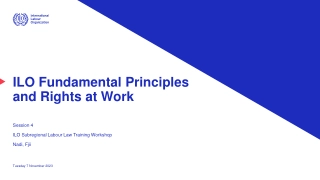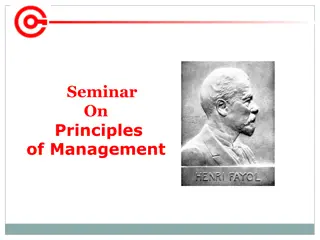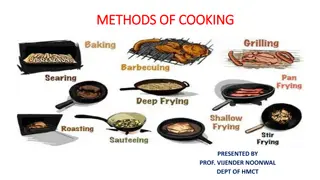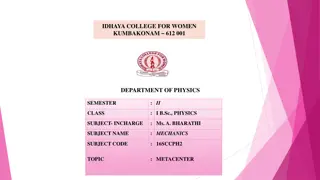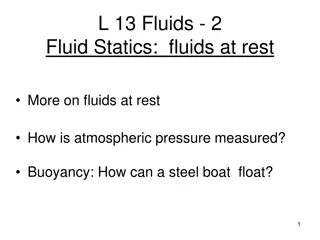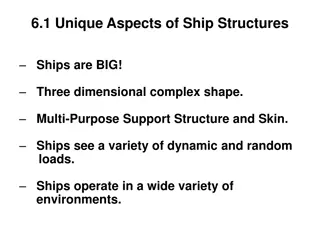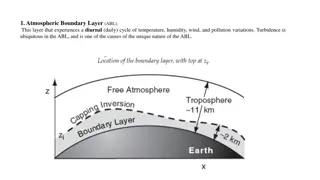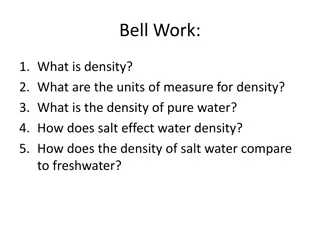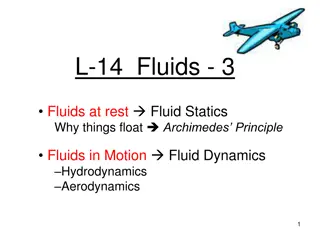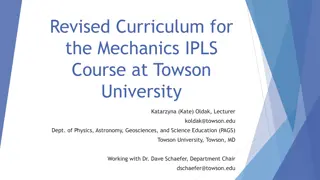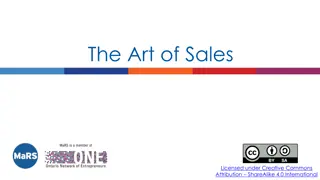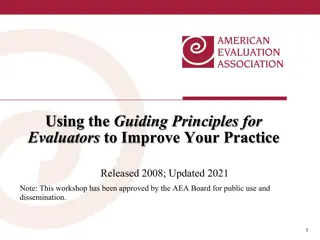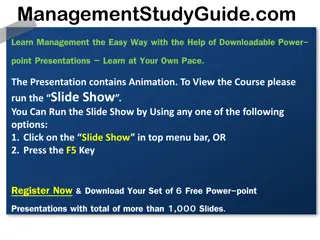ILO Fundamental Principles and Rights at Work
Explore the 5 fundamental principles and rights at work outlined by the ILO, emphasizing social justice and decent work. Delve into how these principles connect with ILO conventions and discuss challenges in their application to Pacific Island Countries.
0 views • 15 slides
Principles of the Ghana Civil Service Code of Conduct
The Code of Conduct for the Ghana Civil Service, outlined by Elizabeth Obeng-Yeboah, emphasizes principles such as abiding by the constitution and laws with dignity, integrity, and professionalism. It sets standards for conduct, avoiding conflicts of interest, maintaining political neutrality, and u
1 views • 34 slides
Understanding Boat Floatation with Archimedes Principle
Explore the concept of why boats float using Archimedes' principle, which explains the relationship between density, volume, and buoyancy. Discover how objects sink or float based on their density relative to water, and experience a hands-on investigation to witness these principles in action.
5 views • 11 slides
Academic Freedom and Shared Governance in Higher Education
Academic Freedom and Shared Governance are foundational principles advocated by the American Association of University Professors (AAUP) to ensure educators have the freedom to explore, research, teach, and discuss without censorship. These principles empower educators to enhance student learning an
0 views • 9 slides
Essential Principles of Management Discussed in Seminar
Explore the foundational principles of management discussed in a seminar on principles of management. Delve into topics such as division of work, authority, discipline, unity of command, and unity of direction as outlined by Henri Fayol. Gain insights into the importance of these principles for effe
0 views • 22 slides
International Law of War: Nuremberg Principles and Accountability
The Nuremberg Principles, derived from the trials of Nazi officials for war crimes, establish accountability in international law. These principles hold individuals responsible for committing acts considered crimes under international law, regardless of their position or orders received. The assumpt
2 views • 22 slides
Understanding Cooking Methods: Conduction and Convection Explained
Cooking methods like conduction and convection are fundamental in culinary arts. Conduction involves direct heat transfer through matter, while convection utilizes the movement of fluids for heat transfer. Gravity and buoyancy play crucial roles in natural convection processes, resulting in efficien
2 views • 45 slides
Understanding Buoyancy and Archimedes Principle
Explore the concepts of buoyancy, Archimedes principle, sink or float scenarios, and examples related to buoyant force calculations and floating objects. Learn how buoyant force determines whether objects sink or float in liquids, and understand the relationship between object density and fluid dens
0 views • 9 slides
Promoting Ethical Principles in Social Science Research
Explore the challenges and strategies for translating and applying ethical principles, especially in emergency contexts. Learn key questions in social science research and how to ensure information contributes to community actions. Understand the importance of considering ethical principles in all w
0 views • 21 slides
Understanding Metacentre in Fluid Mechanics
Metacentre is a crucial concept in fluid mechanics, representing the theoretical point where a displaced body intersects lines passing through the centres of buoyancy and gravity. It is essential for analyzing the stability of floating bodies, especially ships. The metacentric height, the distance b
11 views • 15 slides
Study Guide for Principles of Management Course at Africa Research University (ARU)
Welcome to Africa Research University (ARU)! This study guide is designed to help you navigate through the Principles of Management course (Course Code: PRM4) at ARU. It provides an introduction to the course content, emphasizing the importance of developing management skills to effectively lead and
1 views • 40 slides
Key Principles of Insurance Explained with Visuals
Understanding the principles of insurance is crucial for both insurance seekers and companies. The principles include Utmost Good Faith, Insurable Interest, Indemnity, Contribution, and Subrogation. These principles ensure transparency, fairness, and protection for policyholders. Visual representati
0 views • 6 slides
Understanding Gases and Plasmas in the Atmosphere
Delve into the concepts of gases and plasmas in the atmosphere, exploring topics such as fluid pressure, buoyancy, and the unique properties of gases compared to liquids. Discover how the balance between kinetic energy and gravity determines the thickness of our atmosphere and why it is essential fo
0 views • 25 slides
Principles of Training: Overload, Specificity, and Progression
Principles of training encompass overload, specificity, and progression. Overload requires doing more than usual, specificity involves tailored activities, and progression ensures gradual advancement. These principles are vital for improving fitness levels safely and effectively, emphasizing the nee
8 views • 17 slides
Understanding Ship Stability: Centre of Gravity and Metacentre
Exploring the concepts of transverse statical stability, centre of gravity, centre of buoyancy, metacentre, stable equilibrium, unstable equilibrium, and neutral equilibrium in ship stability. The relationship between these key points determines a ship's stability and ability to maintain a steady po
0 views • 8 slides
Understanding Fluid Statics and Atmospheric Pressure Measurements
Exploring the concept of fluid statics, this content delves into topics such as how atmospheric pressure is measured, buoyancy, and why a steel boat can float. It covers the measurement of pressure, the relationship between pressure and depth in fluids, and demonstrations showcasing these principles
0 views • 24 slides
Understanding Unique Aspects of Ship Structures
Ships have complex three-dimensional shapes and support structures to withstand dynamic loads in various environments. Structural loads such as weight and buoyancy are distributed forces that affect shear stress in ship structures. Strategies to reduce shear stress include matching buoyancy and weig
0 views • 58 slides
Understanding Atmospheric Boundary Layer and Static Stability
The Atmospheric Boundary Layer (ABL) undergoes daily variations in temperature, humidity, wind, and pollution with turbulence being a key factor. Static stability in the environment determines the behavior of air parcels, leading to categorizations of stable, unstable, and neutral conditions based o
0 views • 13 slides
Effective Partnership and Mutual Accountability in Nutrition Clusters
The content discusses the minimum commitments needed for participation in Nutrition Clusters, explains the Principles of Partnership, and explores how these principles can enhance coordination and accountability to affected populations. It emphasizes partner commitments, such as leadership, mainstre
0 views • 7 slides
Overview of Fundamental Principles of Space Law and Outer Space Treaties
The content discusses the fundamental principles of space law highlighted at the United Nations Space Law Conference 2020, focusing on key treaties such as the Outer Space Treaty of 1967 and associated rights, duties, and obligations of states in space exploration and use, including non-appropriatio
0 views • 16 slides
Fun Science Experiments: Sink or Float Activities
Conduct two engaging sink or float experiments using items like an orange, tangerine, water, and tin foil. Learn about buoyancy, density, and the role of trapped air pockets in objects floating. Explore comparative tests and understand why objects either sink or float in water.
0 views • 6 slides
Overview of Directive Principles of State Policy in Indian Constitution
Directive Principles of State Policy (DPSP) in the Indian Constitution encompass social, economic, and political programs aimed at realizing ideals of justice, liberty, equality, and fraternity. They are non-justiciable but guide the state in legislative matters. Classified into Socialistic, Gandhia
0 views • 24 slides
Exploring Aquatic Therapy: Benefits, Techniques, and Research Findings
Aquatic therapy, presented by Beverly Knight, SPT, offers a unique approach to rehabilitation with properties of water like buoyancy and resistance. This therapy can benefit patients with various conditions such as chronic pain, arthritis, and neurological impairments. The content covers indications
0 views • 22 slides
Understanding Water Salinity and Density
Water density is a crucial property influenced by factors like salinity and temperature. Saltwater is denser than freshwater due to dissolved substances, affecting the buoyancy of marine environments. Salinity levels vary in different bodies of water, impacting ecosystems and supporting diverse orga
0 views • 14 slides
Exploring the Fascinating World of Gases and Plasmas in Chapter 14
Delve into the intriguing realm of gases and plasmas as we transition from liquids in Chapter 13. Understand the dynamics of fluid pressure, buoyancy, and the unique characteristics that differentiate gases from liquids. Explore examples illustrating the concepts and ponder over the mysteries of our
0 views • 28 slides
Understanding FAIR Principles in Biomedical Research
The FAIR principles - Findable, Accessible, Interoperable, and Reusable - provide a framework for ensuring scientific data in biomedical research is managed and shared effectively. This informative session delves into the theory and practice of FAIR principles, emphasizing the importance of data qua
0 views • 28 slides
The FAIR Principles for Data Management and Stewardship
Embrace the FAIR principles - Findable, Accessible, Interoperable, Re-usable - for effective scientific data management and stewardship. Learn how annotations enhance data FAIRness and the key attributes of each principle. Dive into the high-level guiding principles that ensure data is globally uniq
0 views • 25 slides
Understanding Buoyancy and Floatation Principles
Buoyancy and floatation principles explained through Archimedes' principle, stability of floating bodies, and stability of submerged bodies. Learn how the upthrust force equals the weight of the displaced fluid, and how equilibrium and stability are crucial for objects to float or sink.
0 views • 6 slides
Understanding Buoyancy and Archimedes' Principle
Buoyancy is the upward force experienced by a body when immersed in a fluid, counteracting gravity. This force is determined by Archimedes' principle, which states that the buoyant force is equal to the weight of the fluid displaced. For floating bodies, the weight of the body equals the buoyant for
0 views • 4 slides
Understanding Why Objects Float or Sink in Fluids
Archimedes' principle explains the buoyancy force that causes objects to float or sink in fluids based on the weight of the displaced fluid. The buoyant force must equal the object's weight for it to float. Objects less dense than the fluid will float, while those denser will sink. Discover the scie
0 views • 22 slides
Hot Air Balloon Competition Overview
Explore the Hot Air Balloon Competition focusing on demonstrating buoyancy and thermodynamics principles through minimal design concepts. The event involves designing and constructing a balloon to maximize payload, flight time, and cost efficiency. Participants follow strict competition rules to add
0 views • 16 slides
Enhanced Mechanics IPLS Curriculum Implementation at Towson University
Towson University's Physics department, led by Lecturer Katarzyna (Kate) Oldak and Dr. Dave Schaefer, has revised the curriculum for the Mechanics IPLS Course. Changes include updated lecture schedules, lab manual enhancements, and in-class activities to aid problem-solving skills. New topics like d
0 views • 9 slides
Mastering Sales: The Art of Selling in the New World
Explore the evolution of sales from the old world to the new world, understanding the ABCs of selling, focusing on Attunement, Buoyancy, and Clarity. Dive into practical exercises to improve sales skills like role-playing and guidelines for effective customer conversations. Learn how to remain optim
0 views • 17 slides
Understanding Density and Related Concepts in Physics
Explore the concept of density and related terms such as mass, viscosity, buoyancy, volume, and more in physics. Learn how to calculate density, understand mass and volume relationships, and solve problems involving the properties of different materials. Discover the principles behind buoyancy, visc
0 views • 35 slides
Understanding the Guiding Principles for Evaluators
This content provides insights into the Guiding Principles for Evaluators, including their history, assumptions, and key principles such as Systematic Inquiry and Competence. The workshop aims to increase knowledge about ethical evaluation practices and stimulate discussions within the evaluation co
0 views • 22 slides
Guiding Principles for GETSI/INTEGRATE Webinar – Materials Development and Goals
The webinar presented by David Steer from the University of Akron focuses on guiding principles for material development in the context of GETSI/INTEGRATE modules. It outlines goals for the session, including discussing components of the guiding principles, examples of meeting those principles, and
0 views • 13 slides
Understanding Henri Fayol's 14 Principles of Management
Henri Fayol, the Father of Modern Management, introduced 14 Principles of Management in 1916, outlining essential guidelines for effective management. These principles cover areas such as division of work, authority and responsibility, discipline, unity of command, and unity of direction. By followi
0 views • 19 slides
Principles of Management: Understanding Henri Fayol's 14 Key Principles
Explore the foundational principles of management through the lens of Henri Fayol's 14 key principles, which offer valuable insights into managerial decision-making and organizational interactions. Delve into the history of Henri Fayol, his contributions to management theory, the concept of authorit
0 views • 14 slides
Understanding Density and Mass in Science
Density is a fundamental concept in science, defined as mass per unit volume. Different substances have different densities, impacting their weight and buoyancy. By measuring mass and volume, one can calculate density and understand properties of various materials, regular and irregular solids, meta
0 views • 12 slides
Legal Principles of Insurance
The legal principles of insurance include indemnity, insurable interest, subrogation, and utmost good faith. These principles ensure fair compensation, financial risk protection, and honesty in insurance contracts. Understanding these principles is crucial for both insurers and policyholders to navi
0 views • 18 slides
